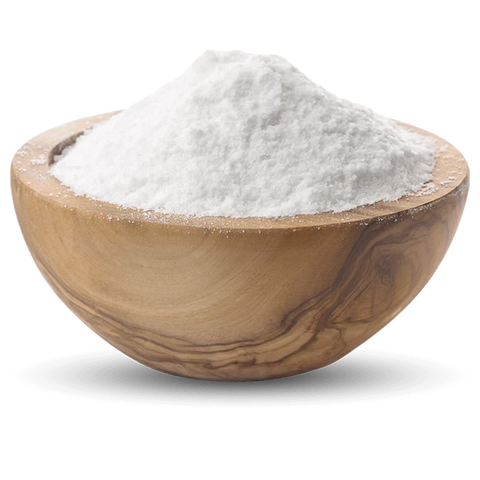
Decoding Allulose: Is It the Ultimate Sugar-Free Sweetener?
Ever wished you could find a sugar that tastes and acts like sugar, but without the calories or blood sugar spike? Meet Allulose, the amazing 'rare sugar' that's changing the game.
With its low-calorie profile and striking resemblance to sugar, allulose presents an enticing option for those seeking alternatives. Its ability to mimic the flavor and texture of sugar opens up new possibilities for mindful sugar consumption. With minimal impact on blood sugar levels and almost calorie-free, allulose ushers in a new era of sweetness. We’re serving up the scoop on allulose: what it is, why it’s become so popular, and how it just might be the best new thing since (keto) sliced bread.
What is Allulose?
Allulose is a low-calorie carbohydrate that occurs naturally in small quantities in foods like figs, raisins, and maple syrup. Unlike other sugar substitutes, what makes this sweetener truly fascinating is its ability to deliver a remarkably similar sweet taste of sugar without the same caloric impact. With only 0.4 calories per gram, compared to the 4 calories per gram in regular sugar (yes, that’s 90% less calories than sugar), allulose is an attractive option for those looking to reduce their calorie intake. Allulose is also approximately 70% as sweet as sugar, allowing for a satisfying level of sweetness while keeping calories in check. All with a clean taste and similar mouthfeel.
Additionally, allulose is not metabolized by the body in the same way as traditional sugar, resulting in minimal impact on blood sugar levels. This makes it suitable for individuals following low-carbohydrate or sugar-restricted diets. Despite its reduced caloric value, allulose still provides a satisfying sweetness, making it a promising ingredient for creating alternative (but just as delicious) versions of our favorite treats.

How is Allulose made?
The “Kombucha of Sweeteners”
So we’ve established that allulose is a versatile sugar substitute that tastes quite similar to sugar. But where does it come from?
Allulose can be produced through two different methods. For mass production, it's commonly made by treating natural sugars found in plants, such as corn or wheat, using specific enzymes. This enzymatic conversion process transforms these sugars into allulose, resulting in a concentrated and pure form of the sweetener.
On the other hand, for smaller-scale production or artisanal purposes, allulose can be obtained through fermentation. In a process similar to making kombucha, natural sugars are fermented using specific microorganisms or yeasts, which convert the sugars into allulose. Regardless of the method used, the end product is a remarkable sugar substitute that offers a low-calorie, plant-based alternative to traditional sugar.
Is Allulose a Sugar…or Sugar-Free?
Allulose is technically a type of sugar, specifically a monosaccharide, which means it shares some similarities with other sugars like glucose and fructose. What sets allulose apart is its distinct composition and metabolic properties. While allulose is derived from natural sources like fruits and grains, it differs from traditional sugar in significant ways. Due to its rare occurrence in nature and limited presence in food sources, allulose is often referred to as a "rare sugar." This rarity, combined with its unique properties, makes allulose an intriguing and sought-after sweetener.
One key aspect is that allulose is not fully metabolized by the body, leading to its classification as a "low-digestible sugar." This means that although it has a sweet taste, allulose is nearly calorie-free. Consequently, while allulose is derived from sugar, it can be considered sugar-free in terms of its caloric impact, making it an appealing choice for individuals aiming to reduce their overall calorie intake.

Is Allulose An Artificial Sweetener?
No, allulose is not classified as an artificial sweetener. Unlike artificial sweeteners such as aspartame or saccharin, allulose is a rare sugar that naturally occurs in fruits like figs and raisins. Allulose also undergoes a minimal amount of processing to extract and concentrate it for commercial use.
This natural origin sets allulose apart from artificial sweeteners, making it an appealing option for those seeking a more natural alternative to traditional sugar without compromising on taste. Its unique properties and low-calorie content make allulose a remarkable sweetener that offers a lower glycemic choice for individuals looking to reduce their sugar intake while still enjoying the sweetness they crave.
Read: Stevia vs Allulose
What Does Allulose Taste Like?
The taste profile of allulose closely resembles that of traditional sugar. It delivers a pleasantly sweet flavor that is remarkably similar, without any notable aftertaste often associated with other sugar-free sweeteners. Many individuals describe the taste of allulose as clean, mild, and well-rounded, making it an excellent substitute for sugar in a wide range of food and beverage applications.
Its ability to mimic the taste of sugar allows for a seamless transition in recipes and formulations, enabling people to enjoy their favorite treats with reduced sugar content. Whether used in baking, beverages, or simply as a tabletop sweetener, allulose provides a satisfying sweetness that appeals to those seeking an alternative sweetener without compromising on taste.

Is Allulose Keto?
Allulose is a suitable sweetener for a ketogenic (keto) diet. The keto diet emphasizes consuming low carbohydrates, including sugars, to induce a metabolic state called ketosis. Allulose has a minimal impact on blood sugar levels, making it a popular choice for those following a keto lifestyle. It provides a sweet taste without significantly affecting insulin levels, allowing individuals to satisfy their cravings without disrupting ketosis.
Additionally, allulose has a negligible caloric content, making it an attractive option for weight management. Other keto-friendly sweeteners commonly used include stevia, monk fruit, and erythritol. These sweeteners provide sweetness without calories or impacting blood sugar levels. They are often blended with allulose in keto-friendly recipes to maintain a low-carbohydrate lifestyle.
Is Allulose Sweetener Safe?
Allulose is generally considered safe for consumption. Regulatory authorities, including the United States Food and Drug Administration (FDA), have granted allulose the status of Generally Recognized as Safe (GRAS). Extensive research and scientific studies have been conducted to evaluate its safety profile, and no significant adverse effects have been reported. Allulose has also been granted a similar status by regulatory bodies in other countries. However, it is worth noting that excessive consumption of any sweetener, including allulose, may lead to some side effects including gastrointestinal discomfort or laxative effects. As with any dietary component, moderation is key. When used in moderation as part of a balanced diet, allulose can be a suitable option for individuals seeking a great-tasting alternative to sugar.
Read: Monk Fruit vs Allulose
Is Allulose a Sugar Alcohol?
No, allulose is not classified as a sugar alcohol. While it shares some similarities with sugar alcohols in terms of taste and texture, allulose is chemically classified as a monosaccharide, a type of sugar. It has a distinct composition and metabolic properties that set it apart from both traditional sugar and sugar alcohols. Allulose offers a unique combination of low-calorie content and minimal impact on blood sugar levels, making it a preferred choice for those seeking an alternative to sugar.
Unlock Sweetness Without the Downsides
So, what makes allulose such a star? It boils down to some truly fantastic benefits for your mindful lifestyle! First off, it's incredibly low in calories– offering the sweetness you love with barely any caloric impact. But here's the real magic: allulose has minimal impact on blood sugar levels. Because our bodies metabolize it differently than regular sugar, it doesn't cause those dreaded spikes and crashes. This makes it an absolute hero for anyone managing blood sugar, following a keto diet, or simply looking to reduce their sugar intake while still enjoying delicious, sweet treats. It's sweetness you can feel great about!
The Bottom Line on Allulose
Allulose has emerged as a delicious and sought-after sugar substitute, providing a solution for those seeking a sweetener that tastes more like sugar. With its plant-based origin, low-calorie content, and minimal impact on blood sugar levels, allulose offers the perfect balance between indulgence and mindful eating. Whether you're looking to manage your weight, maintain stable blood sugar, or simply reduce your sugar intake, allulose opens up a world of possibilities, allowing you to enjoy the sweet moments of life without compromising on taste or diet. Allulose’s ability to mimic the taste and texture of sugar makes it a game-changer in the world of sweeteners. You can find allulose at Pyure Organic, one of the first sweetener brands to market organic allulose, providing a convenient option for incorporating this remarkable sweetener into your favorite recipes and beverages.


